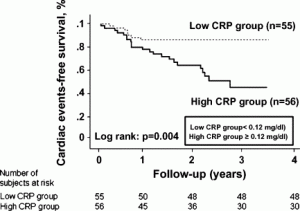At the 75th Annual Scientific sessions of the American Heart Association in Chicago several presentations centered around the use of the C-reactive protein test to evaluate risks for heart attacks, strokes and the risk of restenosing after doing a cardiac procedure to reopen stenosed coronary arteries.
I have previously reported about the use of the C-reactive protein (CRP) test in a review regarding Dr. Paul Ridker’s study in the New England Journal of Medicine.
This study is ongoing and is known under the name “Women’s Health Study”. He followed a large group of women and found that an increase of the CRP was closely associated with heart attacks. Other investigators found now that an increase of CRP is closely linked with obesity, with the metabolic syndrome (also known under “insulin resistance”) and hormone replacement therapy.
There appears to be a pivotal shift among cardiologists in that it is now clear that inflammation seems to be at the center of the process of hardening of the arteries, not just in a few cases, but in everybody who has heart disease. Below I summarized some of the features of CRP in a table.
| C-reactive protein (CRP) and risk for heart disease | |
| Facts: | Comments: |
| CRP is produced by the endothelial cells that line the arteries | CRP is intimately involved with arteriosclerosis. It has been identified as the culprit, which produces hardening of the arteries together with LDL cholesterol |
| CRP interferes with nitric oxide release from the endothelial cells, which is required for normal function | this leads to a dysfunction of the lining of the arteries, atheromatous plaque formation and it stimulates scavenger cells, called macrophages, to take up LDL. CRP also causes plaque destabilization and clotting |
| these factors elevate CRP: | obesity, the metabolic syndrome, hormone replacement in menopause with artificial hormones, but NOT with bio-identical hormones |
| these factors lower CRP: | low carbohydrate diet, exercise, statins, rosiglitazone (Avandia), lowering of insulin |
There will be a lot of information coming out in the next few years. Two major trials have been started where patients with a normal cholesterol, but an abnormally high CRP, will be followed along.
The JUPITER trial will look at the effect of treating these patients with rosuvastatin (brand name: Crestor). About 15,000 patients will be enrolled in this trial and followed for about 4 years. The Canadian 4R trial (Risk Reduction with Ramipril in patients with high CRP) uses ramipril (brand name: Altace) for 12 weeks to see whether it reduces CRP levels. Much more research is needed, but the doctors already know enough about CRP to state that it is a major player when it comes to hardening of arteries. They also know that LDL cholesterol is not outdated, as both LDL cholesterol and CRP play important roles in this process.
Based on a cardiology update in the Medical Post, Dec. 31, 2002, page 17 to 19.
Comments on Dec. 10, 2012: The 4 R Canadian study showed a tendency towards a lowering of CRP with Ramipril, but it was statistically not significant due to numbers that were too low and the observation period was not long enough. The Jupiter trial had to be abandoned after two years as there was concern of diabetes being caused by Crestor and because the effect of prevention of heart attacks was not seen early enough (the number of treatments required before a beneficial effect could be seen was too high). Here is a review why rosuvastatin (brand name: Crestor) should be approached with caution.
Here are other links to related topics that won’t have serious side-effects:
Heart disease: http://www.nethealthbook.com/articles/cardiovasculardisease_heartdisease.php
Two things will lead to a normal weight (as you likely have heard before):
Proper nutrition…http://www.nethealthbook.com/articles/nutrition.php
…and proper exercise (fitness): http://www.nethealthbook.com/articles/fitness.php
Last edited December 10, 2012






